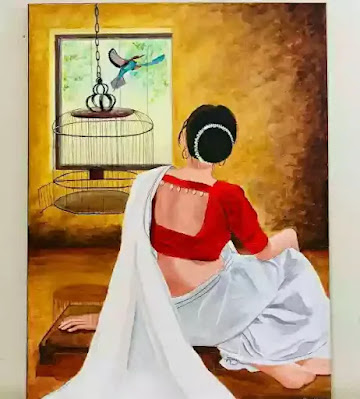Also Read
Charu, Saroja and Nagaraj's mother are minor characters in the novel. Charu is the wife of the protagonist's elder brother, Gopu. She is the daughter of a 'sub-registrar' from Sembiam who is a wealthy and influential person of the area. The wealth, he has accumulated, is earned by levying a percentage as his share on the property registered by unlettered villagers. She is literate. Charu has a touch of modernity in her. She can read some light literature like film magazines etc. As soon as she comes to her in-law's house after marriage, she strictly keeps herself confined to her husband. She breaks the norm of the joint family system of cooking and eating together. The mother-in-law also does not object to her way of living, perhaps, for the reason that she hails from a well-to-do family. Gopu remains confined to his room closeted with his wife. Charu has set up in a separate corner in the family kitchen her cooking-wares and utensils and coks delicacies for her and her husband only on a kerosene stove which she has brought from her parents house whereas the mother-in-law cooks food for other members of the family on a mud-oven.
Charu is cunning enough in making the cooking arrangement in a way that the mother-in-law is not able to notice what she is cooking. With her back towards the mother-in-law, she will mumble some indistinct and indirect replies to the questions put to her by Nagaraj's mother. She goes on serving these delicacies to her husband day-long in his room. Nagaraj is still unmarried. He feels curious to know wha: they go on doing inside the room. Moreover, his mouth waters at the imagination of the delicious items of food Charu is cooking and he can not share even a little of them. The curiosity and interest aroused in the protagonist's mind about the on-going activities between Gopu and his sister-in-law are depicted thus:
"Watching and speculating what went on behind the door was more interesting than housework. While appearing to be reading his lessons he noted from a corner of his eye his sister-in-law bearing a dish of some eatable to their room, perhaps almond fried in butter with a sprinkling of sugar."
Gopu thinks himself like a Sultan to be pampered and served in his room by his wife. She concocts specialities for her husband in strictly limited quantities of which others can enjoy the fragrance only emanating from the stove. The very pattern of living in self-imposed isolation forecasts the crumbling down of the traditional, ancestral system of joint family under the impact of modern thinking and education. The result is the establishment of nuclear families.
Charu does not observe the normal, customary norms of modesty or reservation about any household arrangements. The mother-in-law feels, in her heart of hearts, a pinch at her free and independent ways of purchasing provisions and cooking. But, she does not make it a bone of contention in the family. She rather adjusts herself to the changed atmosphere. She vents her displeasure feebly to herself saying:
"She goes herself to Chettiar's shop, buys something and comes home. Never heard of any young woman going out to a shop by herself. She has brought from her parents house her own stove and vessels, and gives her husband what she likes. I never look at her corner of the kitchen."
Free movements outside the home unescorted by a male member is a trait of a modern woman. There exists a divergence of views between the daughter-in-law i.e. Charu and her mother-in-law. The mother-in-law is conservative in her belief that the food cooked on smoky firewood in the mud-oven is healthful while a kerosene flame causes throat trouble. But the daughter-in-law is modern-fashioned and holds the opinion that wood-fire leads to cold and eye disease and hence she always uses kerosene or charcoal.
Whenever the family eats food jointly, Charu is very vigilant that the delicacies, prepared by her, are served to her husband and for the sake of appearances only, she will serve a little share of food prepared by the mother-in-law. Thus, Charu sows the seed of separation and. self-isolation right from the beginning. Moreover, she serves as a prompter from behind the scene on the issue of partition of ancestral property between two brothers after Nagaraj's father's death. She is in total contrast with Sita in all respects. They are poles apart from each other right from the beginning.
Charu gives birth to a son named Tim. She is deeply atteched with him. She wails and weeps when Tim leaves his village house forever after having had a tiff with his father, Copu. He comes to Malgudi to live with his uncle. Charu misses him and sends Gopu to bring him back but Tim puts his father off by saying that he will come later on to meet his mother. But in fact, he never goes back. Even after his marriage, he stays with his uncle. Charu fails to persuade Tim not to go away from the village and tries to snatch away his trunk but he sticks to his position and she is helpless to let him go. Despite her education and modernity in outlook, she has to spend the days of her life with her husband in the village on the ancestral property of land, cattle and garden.
